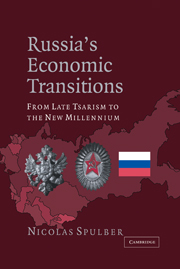Book contents
- Frontmatter
- Contents
- Figures and Tables
- Preface
- PART I THE TSARIST ECONOMIC TRANSITION
- 1 The Socioeconomic Framework
- 2 The Transition Issues
- 3 The Economic Policies
- 4 The Problems of Agriculture
- 5 The Industrial Changes
- 6 Domestic and Foreign Trade
- 7 Money and Banking
- 8 State Finance
- 9 Overall View
- PART II THE SOVIET ECONOMIC TRANSITION
- PART III THE POST-SOVIET ECONOMIC TRANSITION
- Index
8 - State Finance
Published online by Cambridge University Press: 03 December 2009
- Frontmatter
- Contents
- Figures and Tables
- Preface
- PART I THE TSARIST ECONOMIC TRANSITION
- 1 The Socioeconomic Framework
- 2 The Transition Issues
- 3 The Economic Policies
- 4 The Problems of Agriculture
- 5 The Industrial Changes
- 6 Domestic and Foreign Trade
- 7 Money and Banking
- 8 State Finance
- 9 Overall View
- PART II THE SOVIET ECONOMIC TRANSITION
- PART III THE POST-SOVIET ECONOMIC TRANSITION
- Index
Summary
Size and Structure of the Budget
A law of 1862 defined the method of compiling the budget. Subsequently, from 1866 on, the budgetary accounts consisted of the following parts: 1) actual receipts and expenditures; 2) transferences of sums among different branches of administration; and 3) extraordinary revenues (loans, war indemnities) and extraordinary outlays (railways, military, public works). The second category was abolished in 1892. In accordance with a law of June 1894, the ordinary receipts included direct and indirect taxes, duties, and royalties and receipts from state property, funds, and other sources. The ordinary expenditures composed the following main branches: the higher state institutions; the clergy; the ministries and their related services; the ministers of war and of the navy; and the service of the state debt (see Table 8-1).
Faced with the need to increase its outlays, the state fell increasingly into debt. It had to rely not only on increases in direct and indirect taxes, but on expanding domestic and foreign borrowing. The growth of outlays was due notably to the obligations resulting from the land reform of 1861 and the measures involving the transfers of land, to the charges resulting from railroad construction, and to the costs of the wars with Turkey and subsequently with Japan. The purchases of land by the Treasury, which the peasants were supposed to reimburse, weighed heavily on the budget for over twenty years. The expansion of the railway network affected the budget expenditures strongly from 1867 on.
- Type
- Chapter
- Information
- Russia's Economic TransitionsFrom Late Tsarism to the New Millennium, pp. 126 - 137Publisher: Cambridge University PressPrint publication year: 2003



